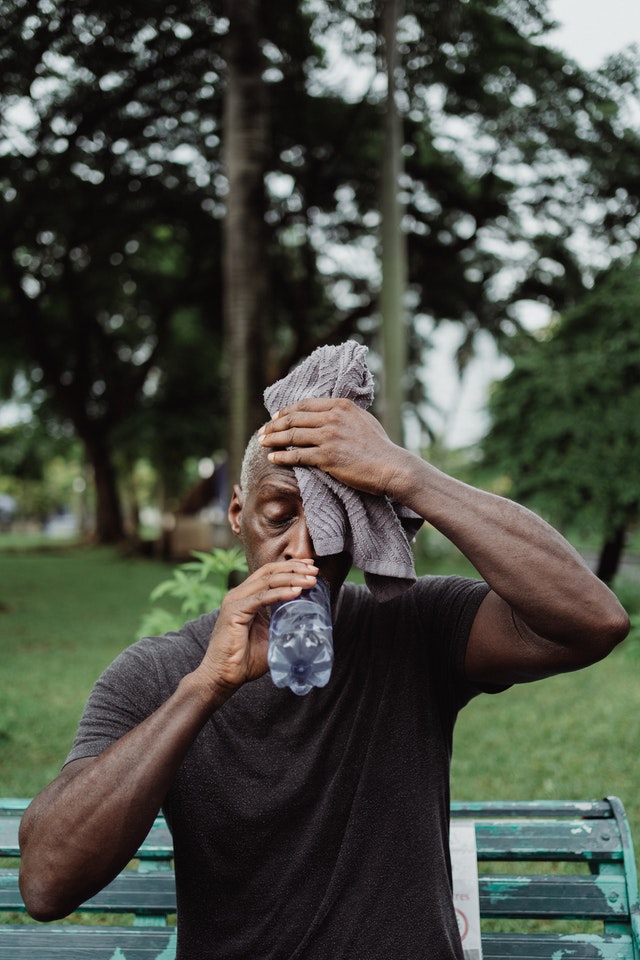
Do you sweat excessively from your scalp and face? If so, you’re not alone. Plenty of people have this condition, which is known as hyperhidrosis. It’s not dangerous to sweat a lot, as long as you are staying adequately hydrated, but it can be both uncomfortable and embarrassing to feel beads of sweat breaking out on your scalp and forehead when you’re in public with other people. Keep reading to learn how you can reduce your scalp sweating.
What Causes Sweating of the Scalp and Face?
Excessive sweating, or hyperhidrosis, can occur anywhere on the body, and the scalp is one of the most commonly affected areas. When hyperhidrosis has no obvious cause (which is true in the majority of cases), it’s known as primary hyperhidrosis. If the sweating is caused by some other known factor, such as an illness, it’s known as secondary hyperhidrosis.
Doctors believe that people with primary hyperhidrosis simply have overactive sweat glands. There may be a genetic component to excessive sweating. Sweating can also be caused by physical exertion, humid weather, and stress or anxiety. If you aren’t sure what is causing your scalp to sweat, it’s a good idea to see your doctor to rule out any medical causes.
8 Ideas for Reducing Your Scalp Sweating
1. Use an antiperspirant or a topical cream.
One of the best treatments for hyperhidrosis is a simple aluminum chloride antiperspirant, just like you’d use under your arms. You can find specially formulated antiperspirants that are made for the sensitive skin of your face and scalp. If you need something stronger, ask your doctor for a prescription cream that contains anticholinergic agents.
2. Give essential oils a try.
Not a fan of the idea of putting antiperspirant on your scalp? Essential oils can be a good all-natural alternative. Try sage, lavender, or tea tree oil to control your sweat production. Just be sure to dilute your oil before applying it to your scalp so it doesn’t burn your skin.
3. Consider Botox.
Botox isn’t just a treatment for wrinkles. It can also make your sweat glands less active. If you choose this route, be sure to find an experienced provider to minimize the risk of unwanted side effects.
4. Wash your hair and scalp every day.
Scrubbing your scalp regularly will keep you feeling (and smelling) clean, and removing oil buildup can help to cut back on your sweating. Apply a little talcum powder to your scalp after your hair dries to keep you feeling fresh longer.
5. Avoid eating spicy foods.
Spicy foods may be delicious, but they can ramp up your body’s sweat production. Skip the cayenne next time you’re deciding what to have for dinner, or limit your consumption of spicy food to times you don’t mind getting a little sweaty, such as when you’re at home.
6. Cut back on caffeine.
Like spicy foods, caffeinated foods and drinks can stimulate your sweat glands, so think twice before you hit the coffee shop for a pick-me-up.
7. Reduce your stress levels.
If high-pressure situations make you sweat, do your best to reduce your day-to-day stress. Consider saying no to commitments you don’t really want to take on, and find a few simple relaxation exercises you can do anywhere, such as deep breathing exercises.
8. Maintain a healthy weight.
Being overweight can be a trigger for excessive sweating. If you are overweight, talk to your doctor about how to safely get down into the healthy BMI range.
The Takeaway
Excessive scalp sweating can be an annoying problem. Luckily, you have options beyond just accepting the sweat. From treating your scalp with essential oils to adjusting your diet and stress levels, there’s a lot you can do to tame your sweat glands and feel more comfortable in your skin, so why not pick one or two of these tips and try them today?



